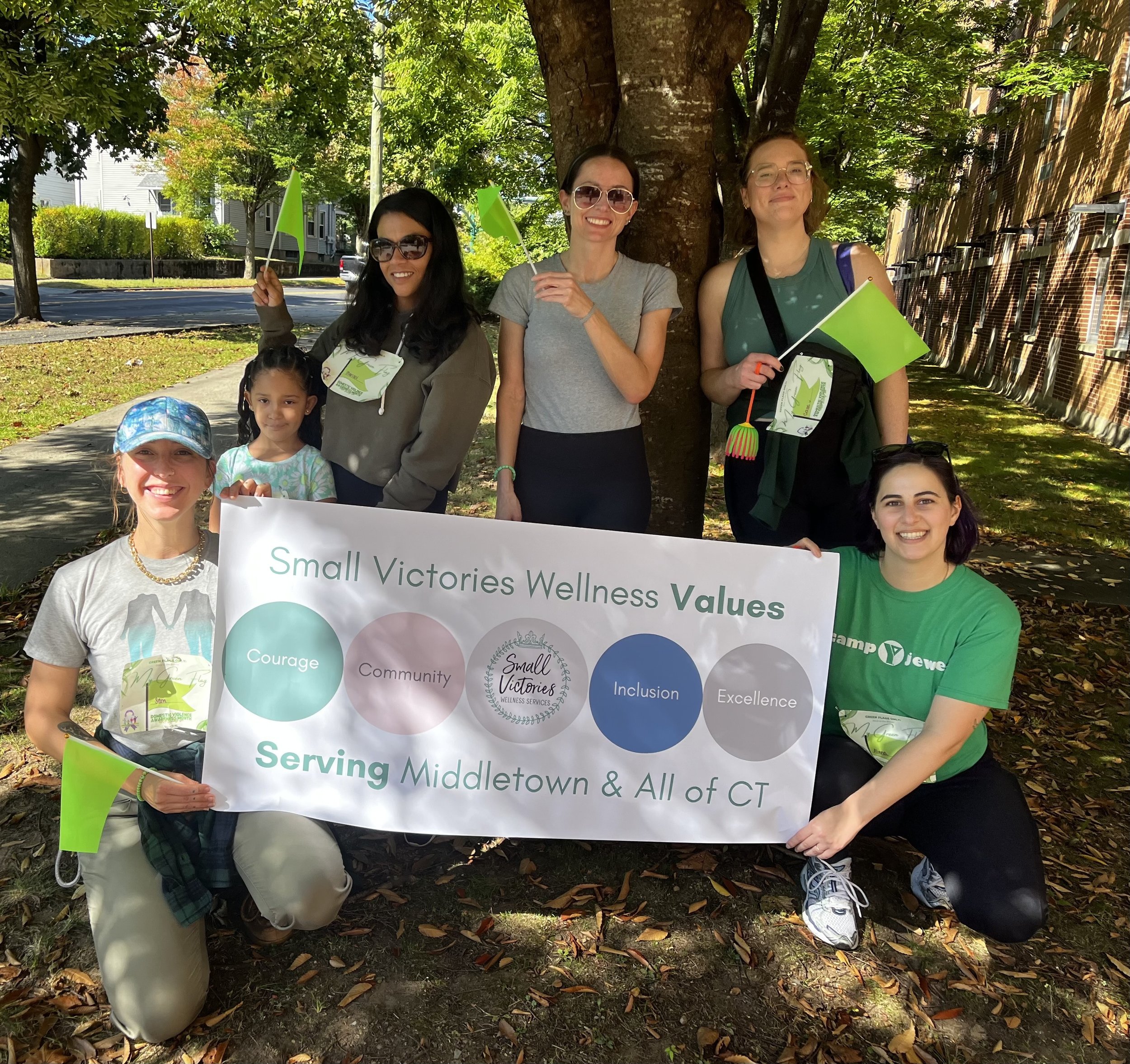A Walk To End Domestic Violence
Trigger Warning - The following blog post contains information and descriptions of abuse and domestic violence, which may be triggering to individuals who have lived experiences or loved ones who have experienced abuse. Please take care of yourself while reading and utilize the following resources as needed: National Domestic Violence Hotline - Free & Confidential. 24/7 - Call: 800-799-SAFE - Text: START to 88788
Five Kinds of Abuse
The following definitions seek to raise awareness about the different forms abuse may take within a household but may not define every type of abuse.
Physical Abuse
Any nonconsensual act that causes physical injury or limits a person’s physical autonomy. Physical abuse may include hitting, punching, slapping, cutting, throwing potentially injurious objects at another person, or physically restraining a person’s motion or ability to speak.
Emotional Abuse
Coercive, exploitative, cruel, or manipulative acts that cause emotional distress and confusion for another person. Emotional abuse can be subtle and typically occurs as a way of maintaining a sense of power and control over another person. Threats of violence, threats of abandonment, lying and gaslighting, harsh criticism, namecalling, screaming at another person, or purposefully humiliating them can all be forms of emotional abuse. Emotional abuse can happen face-to-face or via virtual forms of communication or social media. Emotional abuse is common and often learned and repeated within family systems.
Sexual Abuse
Sexual abuse includes any nonconsensual sexual act or any sexual act occurring between an adult and a minor. Sexual abuse can include elements of physical and emotional abuse used to coerce a person into engaging in sex they do not want to have.
Financial Abuse
Financial abuse involves using financial resources in coercive ways to control the behavior of another person and can include theft, taking unilateral control of money to render the other person dependent, micromanaging the spending of another person, spending joint funds without consulting the other person, concealing financial realities like debt or bankruptcy that may impact another person’s decision-making, or bribing or suddenly withdrawing financial support in an effort to control their behavior.
Spiritual Abuse
Spiritual abuse involves prevention of practicing religious or spiritual beliefs, utilizing a partner’s beliefs to manipulate or shame them, or using religious texts and beliefs to minimize or rationalize abusive behaviors.
Whether or not the descriptions above exactly match the situation you or a loved one has experienced, if you or someone you know is feeling unsafe at home— it is always appropriate to seek support from a trusted community member or professional outside of the home. Intervention can help protect and mitigate harm to victims of abuse and even help people with abusive patterns learn healthier ways to manage their feelings and engage with others.
What are signs that someone is experiencing domestic abuse?
Though some abuse may be easier to define or notice, any kind of abuse can cause serious and lasting harm to individuals, relationships, and the health of family systems. Therefore, it’s important to notice signs that someone may be experiencing abuse.
Signs of abuse may be obvious, such as visible bruises or injuries in some cases of physical abuse but often the signs are more subtle. Victims of abuse may become withdrawn, cancelling plans, or refusing to talk as openly as they once did. Victims of abuse may become anxious or depressed and may become defensive or irritable when questions or criticisms about their abuser arise. The victim may make excuses for the abuser’s actions, words, or absence. The victim may blame themself for the abuse or minimize its severity to protect the abuser. There may be seemingly sudden, drastic changes to a person’s stated beliefs or preferences to more closely align with their abuser’s beliefs.
Who is impacted by domestic violence?
Domestic violence can and does occur in all kinds of households, however, there are factors that may increase or decrease its likelihood. Sadly, abusive behavior is often learned and those who experienced or witnessed abuse in childhood are more likely to perpetrate abuse in adulthood. Stressors like poverty, lack of education, lack of community resources, and social isolation can increase the likelihood of violence occurring. Conversely, community cohesiveness, access to mental health and educational resources, and access to stable housing and resources for daily living can all reduce the likelihood of abuse.
Abuse and the Holidays
Sadly, the holiday season often exacerbates people’s stress— causing incidences of abuse to increase. School and job closures result in more people in the home together for extended periods of time, encounters with family members with whom there may be unresolved trauma or conflict increase, and the pressure to perform festivity and spend money on gifts can create feelings of shame or deprivation if families cannot afford to celebrate the holidays as they think they “should.” Close quarters and increased pressure do make abuse more likely if individuals do not have healthy coping skills to manage the stress.
Knowing the signs of abuse and the impacts of holiday stress can help you be aware and supportive to those around you who may be at risk. TheHotline.org has many helpful suggestions for how to support someone who may be experiencing abuse.
How do we support those experiencing intimate partner violence?
Small Victories’ Connecticut clinician, Krystle Hanewicz, LMFT, shares advice to those who are supporting folks experiencing intimate partner violence:
“Witnessing someone you care about experiencing domestic violence can be incredibly challenging and heartbreaking, often resulting in feelings of powerlessness and frustration when efforts to help or support are not accepted or successfully received. It’s important to remember that your support can make a significant difference in a victim’s ability to seek help. If someone you care about is experiencing intimate partner violence (IPV), here are 4 ways to effectively support them:
1. Listen More, Speak Less
Create a safe and non-judgmental space for your loved one to talk. Let them know you are there to listen and believe them.
Avoid pushing them to share details before they are ready. Give them the space to share at their own pace.
2. Validate Their Feelings
Acknowledge their emotions without minimizing the situation. Let them know that their feelings, whether it’s fear, confusion, shame, or guilt are normal reactions to abuse.
Avoid saying things like “Why don’t you just leave?” or “If I were you…” because it oversimplifies the complex dynamics of abuse and can make them feel unsupported.
3. Ask Permission to Give Advice/Resources (and Remind Them They Can Say No)
Help them find resources such as local shelters, hotlines, and counselors. Provide them with phone numbers or websites for domestic violence services.
Offer assistance with tangible needs (e.g. helping them pack a bag, arrange a safe place to stay, obtain pet care and/or childcare) if they are in immediate danger.
Sometimes the person may be afraid to leave, so helping them make a safety plan can be useful.
4. Be Patient and Respect Their Choices
Leaving an abusive relationship is complicated and often takes time. People in abusive relationships may feel trapped due to fear, financial dependency, or emotional manipulation.
Respect their autonomy. Avoid pressuring them to leave or take steps they are not ready for.
Small Victories and A Walk To End Domestic Violence
On a beautiful fall day, October 5, 2024, in New Haven, Connecticut, Small Victories Wellness staff gathered to participate in the Family Centered Services 5K, "A Walk to End Domestic Violence."
At Wilbur High School's cafeteria, we were warmly welcomed by vendors from the greater New Haven area. The event offered raffle prizes and provided tote bags filled with self-care items and information about IPV.
Groups assembled with picket signs—some bearing photos of loved ones lost to domestic violence and others displaying words of affirmation. Together we walked, honoring those affected by IPV, promoting healthy relationships, and standing against domestic violence.
After completing the 5K walk, we returned to the cafeteria for sandwiches, popcorn, and ice cream. Family Centered Services announced raffle winners and recognized community members working to end domestic violence in CT. It was a bittersweet moment—people from all walks of life uniting to take a stand against a tragedy that affects so many families.
Resources
Connecticut Resources
Connecticut Coalition Against Domestic Violence
655 Winding Brook Drive, Suite 4050
Glastonbury, CT 06033
Additional resources through Connecticut Coalition Against Domestic Violence:
CTSafe Connect
https://www.ctsafeconnect.org/
Call or Text: (888) 774-2900
Advocates are available 24/7.
All languages are supported!
The Address Confidentiality Program (ACP)
Helps victims of domestic violence, among others, keep their new address confidential.
Call or Text: (888) 774-2900
Advocates are available 24/7
Connecticut Coalition Against Domestic Violence works with 18 other organizations to help victims, survivors, and families get support across the state of Connecticut.
https://www.ctcadv.org/about/members
Susan B. Anthony Project
Torrington, CT
Phone: (860) 489-3798
Domestic Violence Crisis Center
Phone: (203)-588-9100
Fax: (203)-588-9101
Norwalk Office/Mailing Address:
5 Eversley Ave., Suite 201
Norwalk, CT 06851
Stamford Office:
111 Summer St. Suite 203
Stamford, CT 06851
OVS Victim Compensation Program
https://www.jud.ct.gov/crimevictim/compensation.htm
Phone: (888) 286-7347
Email: OVSCompensation@jud.ct.gov
Offers financial help to:
Victims of a physical injury, including victims of domestic violence and their family members
Victims of an emotional injury from a direct threat of either physical injury or death who received treatment or
A child who witnessed domestic violence, including children not related to the victim or other persons who have experienced certain financial loss because of a crime
Missouri Resources
National Domestic Violence Hotline
1-800-799-7233
National Sexual Assault Hotline
1-800-656-4673
Deaf Crisis Line videophone call
(321)-800-3323 or text HAND to 839863
Missouri Coalition Against Domestic and Sexual Violence
Phone: (573) 634-4161
217 Oscar Dr., Suite A
Jefferson City, MO 65101
ALIVE- Alternatives to Living In Violent Environments
Provides emergency shelter, counseling, court advocacy, and other critical services for abuse survivors of all gender identities.
ALIVE Crisis Line
24/7 crisis line: (314)-993-2777
Professional staff and trained volunteers provide immediate assistance to victims of family violence 24 hours a day, seven days a week, 365 days a year.
Harmony House
https://www.myharmonyhouse.org/
3404 E Ridgeview
Springfield, MO 65804
Office: (417)-837-7700
Fax: (417)-837-7707
Hotline: (417)-864-7233, (800)-831-6863
Lafayette House
Business Phone: (417)-782-1772
24/7/365 crisis line: (800) 416-1772
Sources Referenced
https://www.webmd.com/mental-health/mental-domestic-abuse-signs
https://www.cdc.gov/intimate-partner-violence/risk-factors/index.html
https://www.thehotline.org/support-others/ways-to-support-a-domestic-violence-survivor/
https://portal.ct.gov/-/media/sde/tdv/connecticut_domestic_violence_resources.pdf
https://www.thehotline.org/resources/



